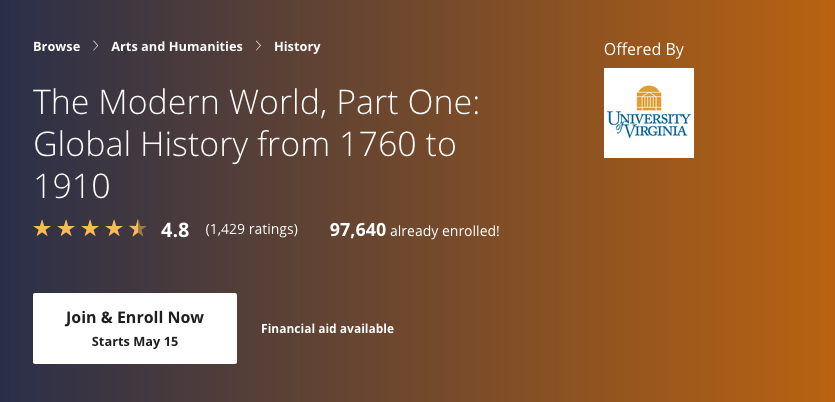Week 7 Modern World

Second Industrial Revolution
- Driven by chemistry
- Machines to make other machines is the biggest change.
- Mass produced machines start having impact on common men and women.
- Electricity!
- Large corporations start becoming common as pace of industrialization quickens.
- Large population migration to cities, start of rapid urbanization in US, Europe and other parts of the world.
- Mass produced consumer products, like coca-cola, which are sold everywhere in the country and world.
- Pharmaceuticals, surgical machines, x-rays, and may other advances in healthcare products.
- Manufacturing needs raw materials, which leads to mining frenzy.
- Universities, private and government funded, leading the pace of research and development.
- The speed of - Problem->Solution->Problem quickens.
Modern Capitalism
- Gold standard
- Starting with Britain, increasing number of countries adopted gold standard and standardized money.
- Money exchange rates stabilized, giving acceleration to international trade.
- Gold rush in South Africa, Alaska and other parts of the world.
- Banking institutions such as insurance, trade exchanges, bonds market became common.
- Large corporations
- Assembly lines made it possible to make products, extremely cheaply with out requiring craftsmanship.
- Factory towns in all over United States which produced machine made products.
- Limited Liability companies.
- Industrial society
- Universities
- Police
- Doctors
- Professional services - advertising, typing, marketing.
- As a response to increasing power of large corporations, workers started unions.
- Food Manufacturing and processing became big industry to support increasingly urban population.
- Safe seas made world trade much more reliable.
World trade grew 400% from 1890 to 1910.
Modern political systems
- Modern cities are faced new kinds of problem, living conditions, wages, working conditions.
- Size of modern cities, spread of newspapers enable rise of modern political parties which have millions of members.
- Politics breaks away from only elite class and is becomes an important aspect of lives of common citizens.
- Various violent protests across Europe and US by anarchists.
- Many political ideologies gain widespread support.
- National Traditional - religious, want to maintain established order, racial and ethnic. Rural containing farmers, landowners.
- National conservatives - secular, pro big business, strong national governments, protectionist, modern military. Supported by new professional class.
- Liberals - limited/weak national government, individual liberty, secular or Christian, pacifist, anti empire, free trade and free markets, equal rights to women. Supported by small farmers, small businesses.
- Democratic socialism - strong national government, against big business, secular, workers rights, unionists, pacifist,
- Revolutionary socialists - against existing order, against military and police, secular, direct (violent) action, strikes, marxists, internationalist.
Political wars
- All over the world status quo is being challenged.
- China - empire falls, giving way to a republic led by conservatives.
- Russia - After being defeated by Japan, peasants rebel. Empire survives, but is now considering reforms and adopting a constitution.
- Spain, Mexico, Ottoman empire all under go political upheavals resulting in change in political systems.
- Governments are forced to adopt more libertarian values as a result.
1890 to 1990 (end of cold war), the hundred year wars, is defined by struggle about how to organize modern nation states.